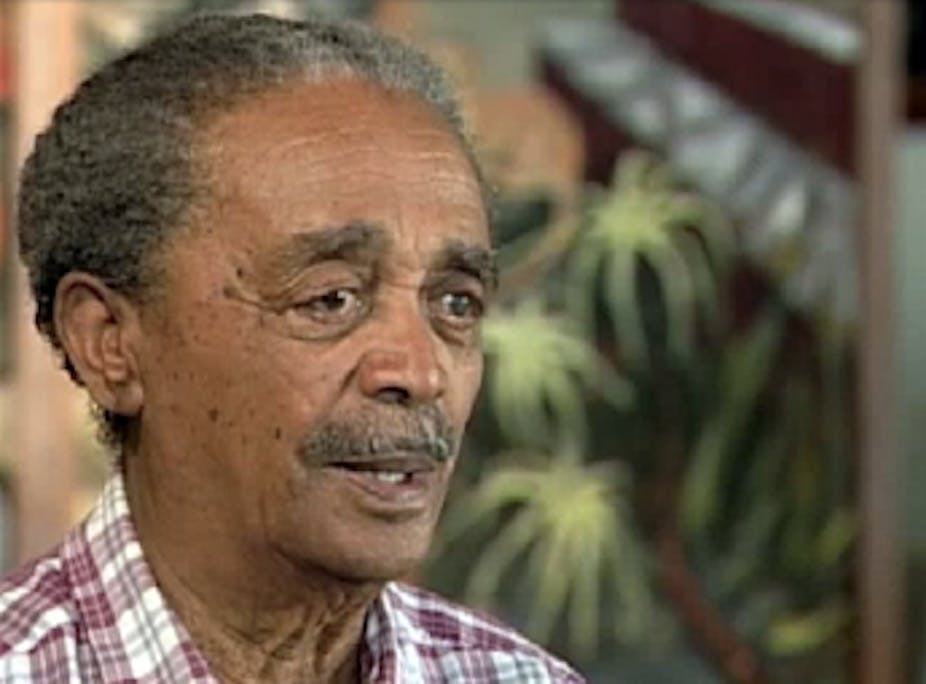South African literary icon and Pan-Africanist, Peter Henry Abrahams, died in his adopted home of Jamaica on January 18 2017. He was 97. The author of some 12 novels, Abrahams was also a stalwart in the anti-colonial struggles dating back to the 1940s. Until the end he remained an acerbic and incisive commentator on global and Pan-African affairs.
He was born to an Ethiopian father and a mixed race South African mother in Vrededorp, a suburb in Johannesburg, South Africa. As a 20-year-old, Abrahams left his birthplace in 1939 after running into trouble with racist police and authorities in his deprived settlement. After an eventful journey by ship, troubled by hostilities during World War 2, he eventually arrived and settled in London, England. There he began a career of activism as a left wing journalist and Pan-Africanist in the 1940s.
Peter, with a natural storytelling talent, had learned writing skills from his mother and from religious mentors who rescued him from further trouble as a militant youth in Vrededorp. These skills and talents were to serve him well during his exile in London and later in Jamaica, where he settled in 1956 with his second wife Daphne.
First novel
While in London during his early literary pursuits his first novel, “Dark Testament”, was published in 1942. His second book “Song of the City”, published three years later, confirmed him as being among the first successful black South African writers being published in Europe and the West.

His already prolific writing career next saw the publication of the semi-autobiographical and seminal book “Mine Boy” in 1946. It charted the travails of a country youth seeking to survive in the frightening and oppressive environs of big city Johannesburg.
With “Mine Boy” Abrahams became the first author to bring the horrific reality of South Africa’s apartheid system of racial discrimination to international attention. Published two years before Alan Paton’s acclaimed “Cry, The Beloved Country”, which also exposed the tragedy of apartheid, “Mine Boy” was also significant because it made Abrahams one of the first black South African authors to become financially successful. With over a dozen books and countless newspaper and magazine articles published, Abrahams has since become established as an authority on the problems of race not only in South Africa, but in the world.
Several other novels were to follow in London, even as Abrahams became more and more engaged in the anti-colonial struggles of the time. He interacted with other political activists such as Jomo Kenyatta, Seretse Khama, Kenneth Kaunda, Julius Nyerere and Kwame Nkrumah. Those names now resonate as leaders of the legendary generation of anti-colonial, Pan-African activists who led their respective African countries to political independence.
At this time, his South African compatriots under the leadership of Nelson Mandela, Oliver Tambo, Walter Sisulu and others persevered politically (and in some cases militarily) in the struggle against apartheid. For his part, Abrahams waged a war by wielding a mighty pen. He brought the unfolding racist atrocities in South Africa to the attention of the wider world. This he did through an ever-expanding body of compelling political and literary works, as well as through his intellectual activism.
He played an important role, alongside journalist and Pan Africanist George Padmore of Trinidad and Tobago, American intellectual and activist WEB Du Bois and others, in organising the Fifth Pan-African Congress. Held in Manchester, England in October 1945, the congress was regarded as a unifying event in the multifaceted, disparate, colonial struggle of the time. Abrahams was among the representatives of the African National Congress (ANC). He was elected as chairperson of the movement’s publicity committee, alongside a young Nkrumah.
Jamaican independence
By 1956, he accepted an invitation from Norman Manley, Premier of Jamaica and leader of the Jamaican independence movement, to provide advice and editorial services in Jamaica and the Caribbean. He soon acquired a hilltop property overlooking the city of Kingston, a home he called Coyaba.
Abrahams became prominent as journalist and radio commentator in Jamaica. He also continued his career as a novelist. Acclaimed books penned in Jamaica were released globally. These included such widely respected works as “The View from Coyaba” (1985) and his memoir “The Coyaba Chronicles: Reflections on the Black Experience in the 20th Century” (2000).
Abrahams was to serve Manley’s younger son, Prime Minister Michael Manley, in the historic social restructuring of the 1970s. This included the engagement of Abrahams as the principal advisor in the government takeover and reform of Jamaica’s leading radio network, Radio Jamaica, from the British Rediffusion Group.
Responding to question I posed to Abrahams in a July 2004 interview, he defended a new model of media ownership he had developed.
He (Michael Manley) wasn’t quite sure what the model was but he knew it had to be ‘people-based’. So he called me and we had a long session. What the Re-diffusion was saying to him was, ‘all right, you take it over but give us a management contract and so much per annum’. So they would be getting their money anyway. I said to him I don’t think you need to give them a management contract. I am convinced that there are enough Jamaicans who can run this thing without a management contract.
His model succeeded and is among the seminal achievements in Jamaica of this 5ft 6in (1.52m) giant of an intellectual, activist and author.
His passing cannot erase the phenomenal contributions he made to the anti-colonial struggles in Africa and the Caribbean, his scholarly eminence and his seminal leadership of media reform and commentary in Jamaica.

